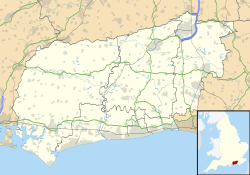Church of the Holy Sepulchre, Warminghurst
| Church of the Holy Sepulchre | |
|---|---|

The former church from the east
|
|
|
Location of the church within West Sussex
|
|
| 50°56′25″N 0°24′41″W / 50.9403°N 0.4114°WCoordinates: 50°56′25″N 0°24′41″W / 50.9403°N 0.4114°W | |
| Location | Park Lane, Warminghurst, Ashington, West Sussex RH20 3AW |
| Country | United Kingdom |
| Denomination | Anglican |
| History | |
| Founded | By late 12th century |
| Dedication | Holy Sepulchre |
| Dedicated | By 13th century |
| Architecture | |
| Functional status | Redundant |
| Heritage designation | Grade I |
| Designated | 15 March 1955 |
| Style | Early English Gothic |
| Closed | 1 April 1979 |
| Administration | |
| Parish | Thakeham with Warminghurst |
| Deanery | Storrington |
| Archdeaconry | Horsham |
| Diocese | Chichester |
The Church of the Holy Sepulchre is a former Anglican church in the hamlet of Warminghurst in the district of Horsham, one of seven local government districts in the English county of West Sussex. The present building, which is no longer used for worship, has 13th-century origins, but a church may have existed on the site in the 11th century or earlier. Often administered in connection with other churches in the rural area of West Sussex in which it was built–churches at nearby Steyning, Ashington and Thakeham were all involved with it at various times–its congregations declined and closure came first in the 1920s and then for good in 1979, when it was declared redundant. Unlike many ancient churches in Sussex, it was not subject to restoration in the mid-19th century: its interior has been called "the finest example in Sussex of how many must have looked before the Victorian restorers". After a period in which the Early English Gothic stone-built church fell into dereliction, prompting one Sussex historian to lament its "unloved" appearance, it was taken into the care of the Churches Conservation Trust. English Heritage has listed the church at Grade I for its architectural and historical importance.
Warminghurst (from Old English meaning "the high wood of Wyrma's people") is an ancient parish at the south of the Weald, close to where the South Downs rise. It is long from north and south, narrow and largely rural; its village, never very large, has disappeared since the medieval era. Development was always scattered rather than nucleated because the land around the church and manor house sloped steeply away on all sides.
...
Wikipedia

